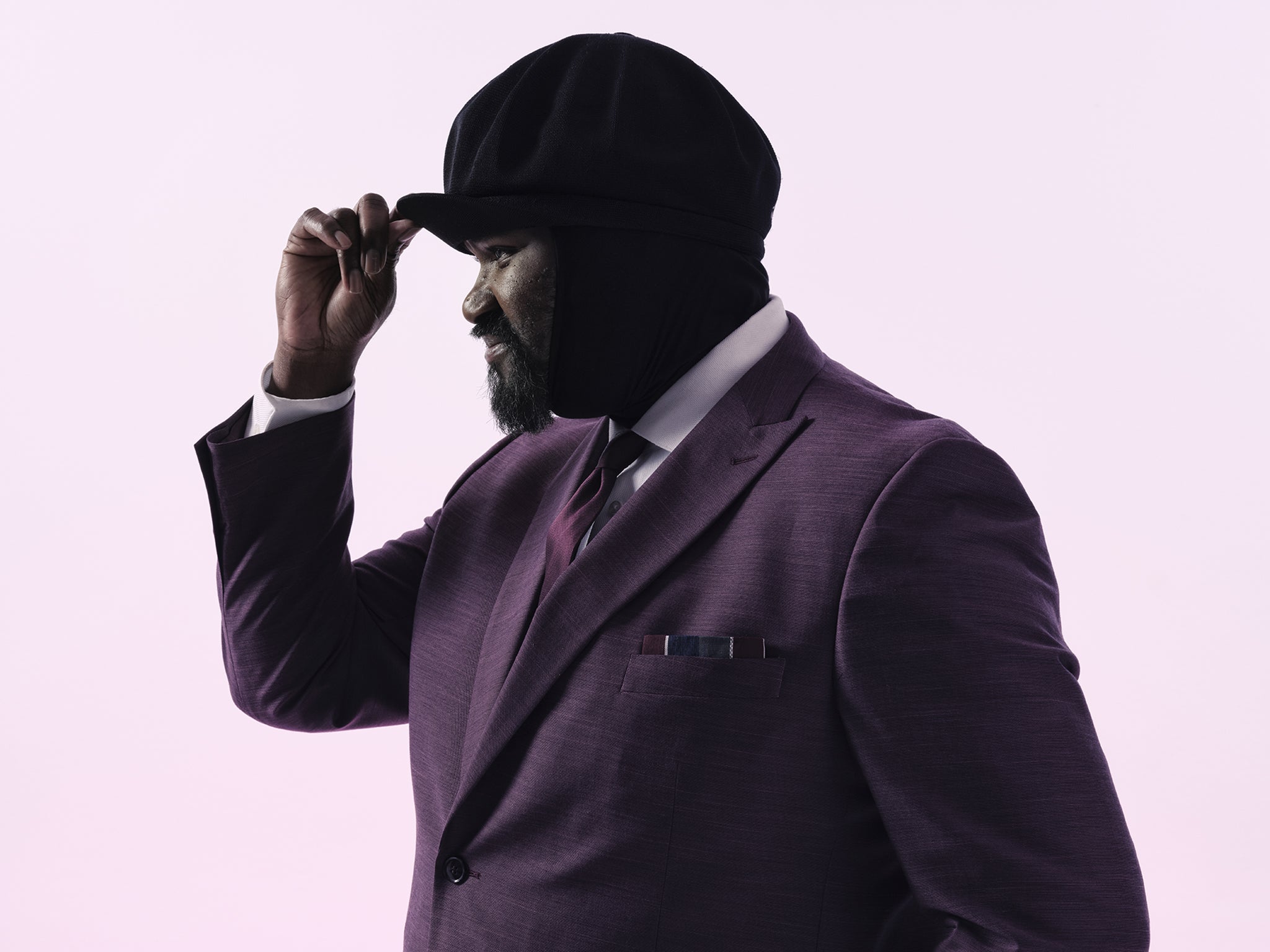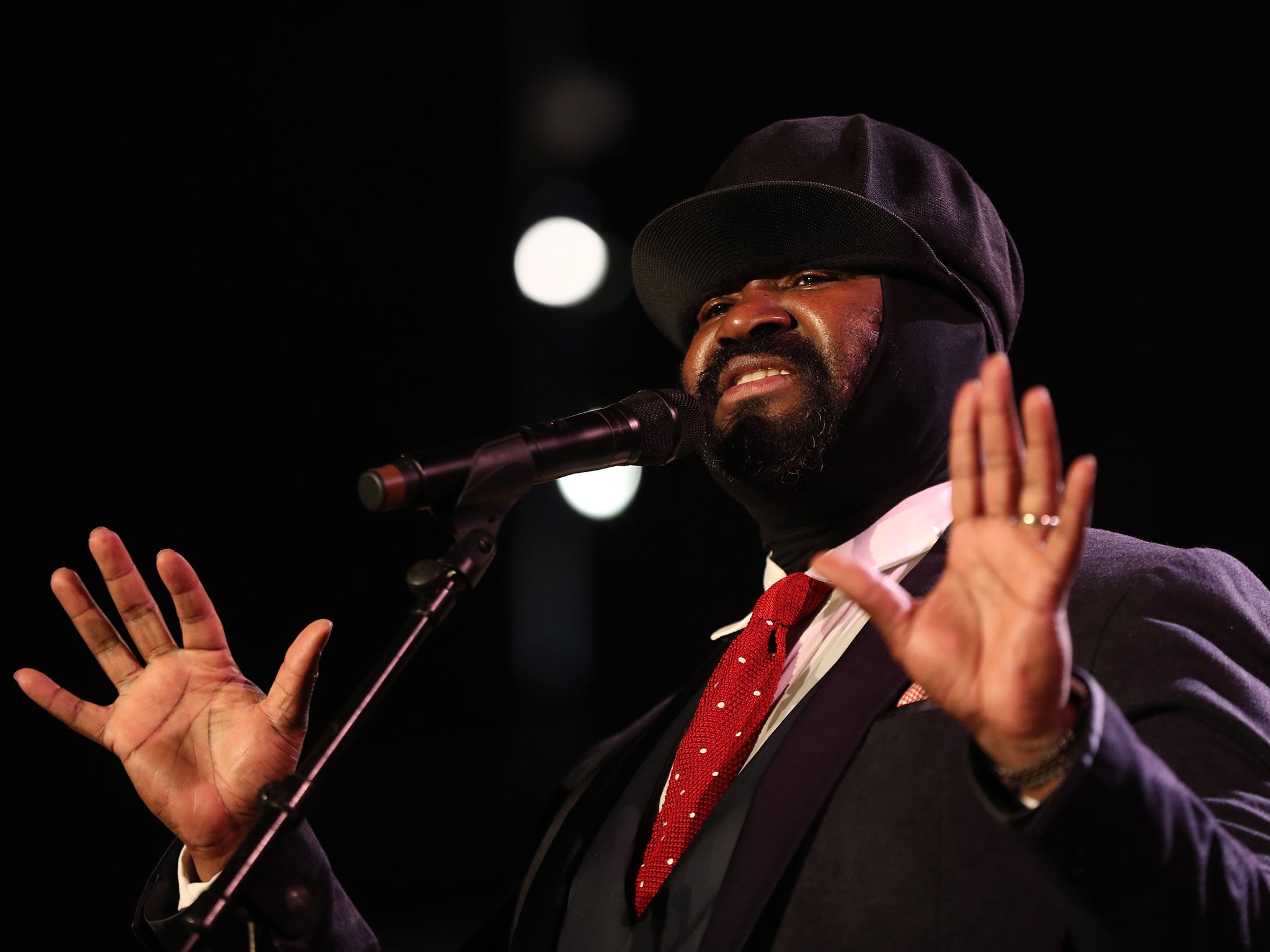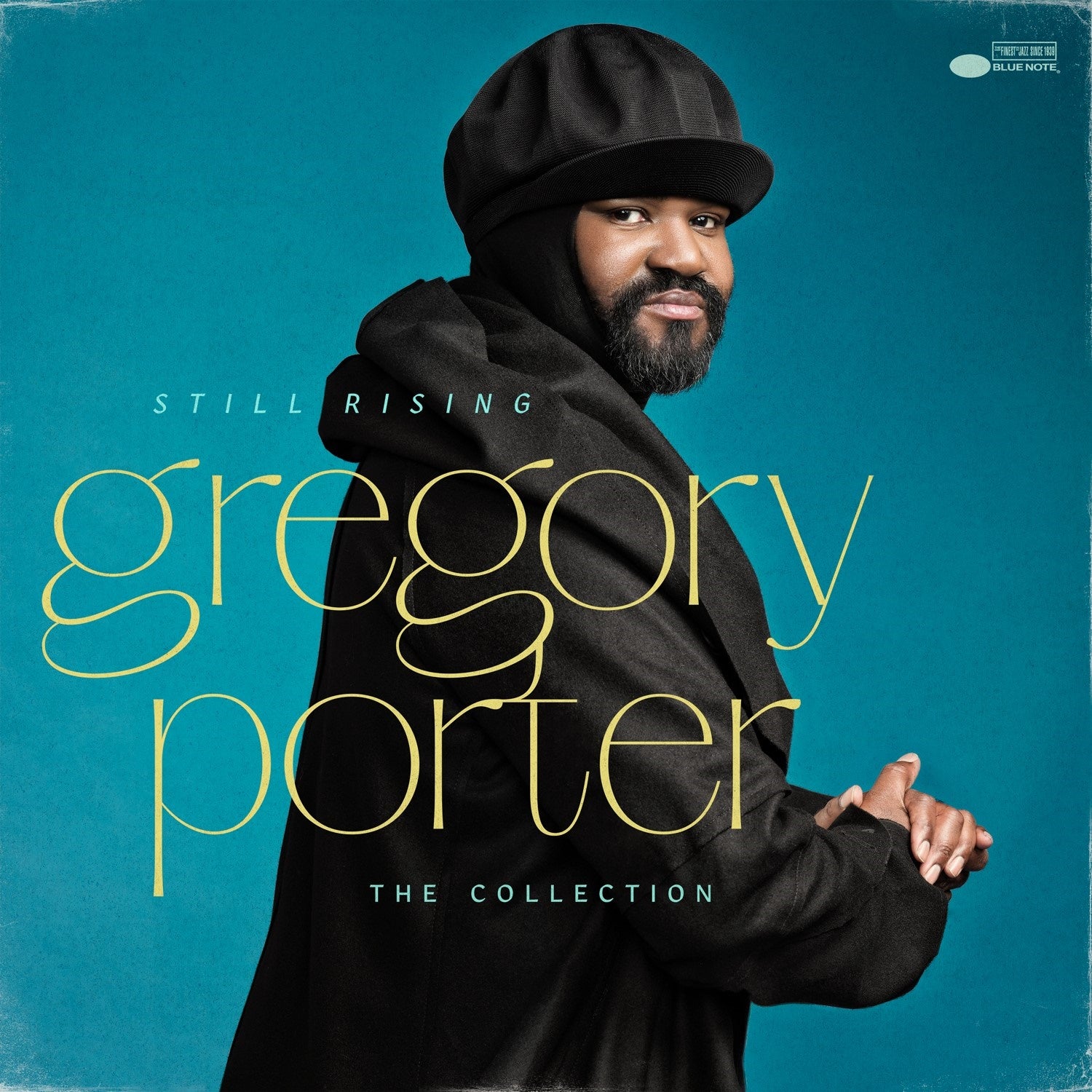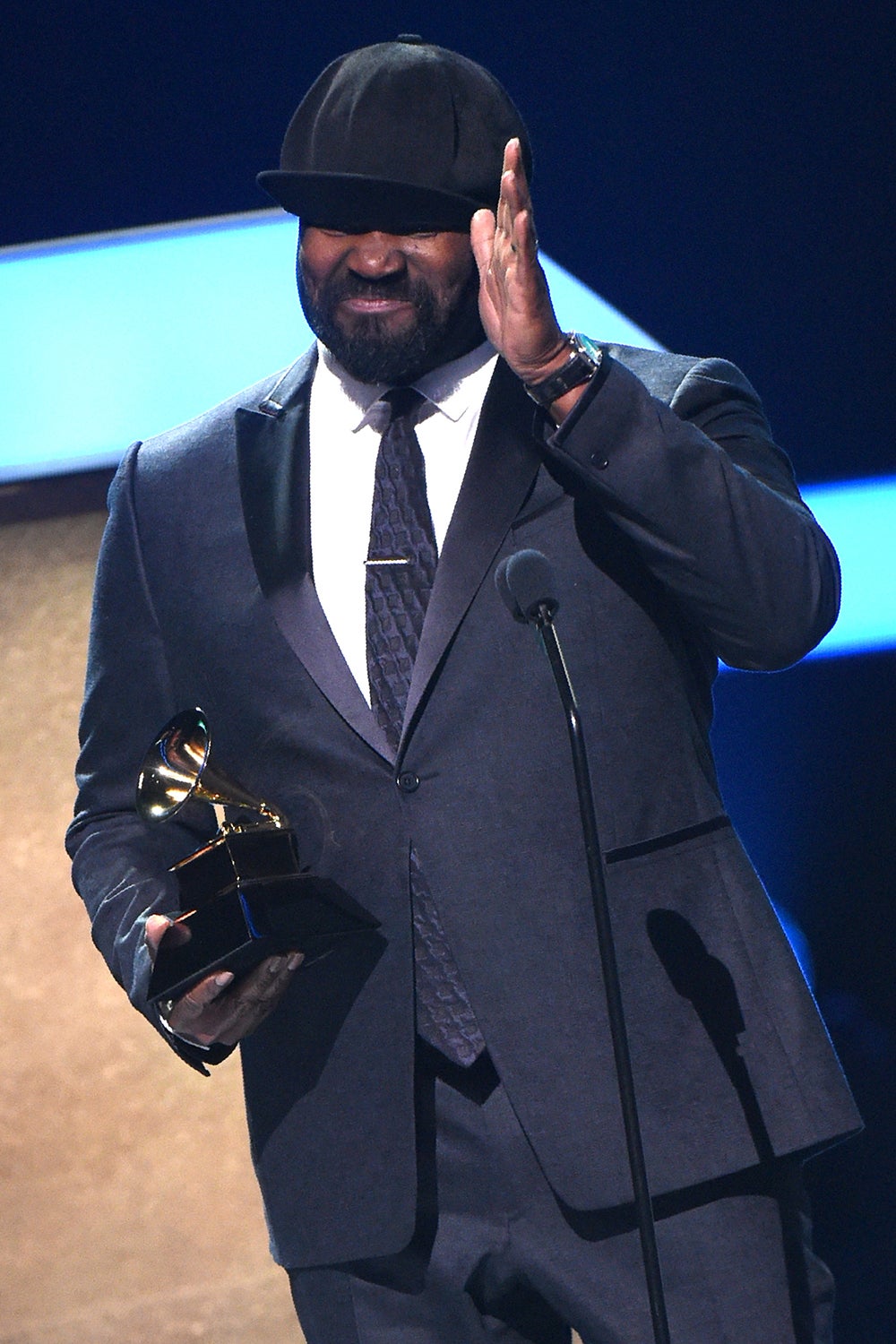Gregory Porter interview: ‘Did I want to go to a cross burning? Did I want to see my brother being shot? No’
The Grammy-winning singer talks to Elizabeth Aubrey about his new album ‘Still Rising’, his scarring experiences with racism as a child, and losing his brother to Covid-19

I said my whole life my father gave me nothing,” says jazz musician Gregory Porter, “but the very reason I fill the Royal Albert Hall, the very reason I do television shows and all this, is because of a gift from him.”
That gift was his voice. A velvety blues-baritone, it melds optimism with grit, hinting at pain without ever letting it dominate. It’s been compared to Lou Rawls, Bill Withers and Teddy Pendergrass – but he got it from his dad.
Porter spent only a handful of days with his father growing up; he and his seven siblings were raised by their mother, who held down three jobs to make ends meet. It was only at his father’s funeral that he learned from family members what an incredible singing voice his dad had. “So he did give me something,” says the 49-year-old, over video call from his hotel in London, “and I’m getting the sweetness out of it now. It was a sad thing for more than 30 years but now I’ve managed to flip the script on that and turn it into a positive. I can now say that he did give me something that feeds my family.”
It does more than that. The 49-year-old has won two Grammys, released seven studio albums (including the most-streamed jazz album in history, Liquid Spirit) and brought jazz to the masses with sold-out performances at the Royal Albert Hall, regular TV spots and a vibrant performance at Glastonbury in 2016. His latest album, Still Rising, combines his most beloved tracks with new songs and duets. It’s a sign of how respected he is that those duet partners include Moby, Jeff Goldblum and Laura Mvula.
Still, it took Porter a little while to get here. He would often sing at church as a child (where his mother was a preacher) and at high school, where he beat his classmates – the rock band Korn – at the school talent contest. “They should have won, but they flipped the finger at the audience as the curtain closed,” he says with a laugh. But finding his voice wasn’t easy. He struggled with his self-confidence – “I was very shy” – and having grown up poor, he was worried that trying to make it as a musician would leave him with no money. It was his mother, on her deathbed, who convinced him to pursue music.
“I was trying to assure my mother when she was sick that I would be as normal and regular as possible,” Porter recalls. He was 21 and a college student at the time. “I told her I’d always wear brown shoes to work, and not to worry, but she was like, ‘No! Wait a minute – don’t forget about those flowery slippers that you have!’” It was her metaphor for his creative ambitions. “She said to me: ‘Your singing voice is the best thing you have, so don’t forget it.’ I was trying to assure her that she did a good job, that she raised a stand-up, regular guy and she was like, ‘No! Be risky!’ And so I took that.” Two days later, she died from cancer. The pain of it is still written on his face.
“I was risky for a long time,” he continues. Having spent years struggling to balance a job as a full-time chef alongside his singing, he was nearly 40 by the time he got his first big break. A guest spot on a track by famous flautist Hubert Laws led to a role in a musical, It Ain’t Nothing but the Blues, which in turn led to a record deal. His Grammy-nominated debut soon followed, and two years later, he signed with the famed jazz label Blue Note.
“I knew I could sing in my twenties, I just didn’t know what to sing,” he says with a smile. “Now, I know what to sing, I know who I am as a man, and I know what I want to say. With those years of not having success, the struggling and the failing, it made me who I am today. I am the ultimate underdog story.”
Porter is warm and open, his bright smile the mark of a man who is content after decades of struggles. He’s dressed in a sharp navy suit, replete with a pink paisley handkerchief in his top pocket, a blue, leopard-print waistcoat and his signature black Kangol hat. Still Rising “isn’t a greatest-hits” collection, he insists, despite it containing nine of his most beloved tracks. Leaning into his gospel roots and soulful inspirations, while experimenting with jazz and electronic sounds, it was a way of joining the dots between the various facets of his career.
Many of the songs explore the bonds of family and friends. The elder of Porter’s two sons even appears on the album (“If they choose such a career,” he says, “I will encourage them like my mother encouraged me”). It’s an especially poignant theme given the year Porter’s had: he lost his brother and several close friends to Covid-19. The loss is hinted at throughout the record. “I did write songs on this record that are marginally about what I’ve gone through, but I have to say I’m still processing the loss of my brother,” he says. “I think it will come out over time, but maybe not as a commercial pursuit. It may be just a personal song that I record at the best studio in the world, just for me, with an orchestra. You may not even hear it; I don’t know yet. He meant so much to me and because of that, I’ll have to take my time with it.”
The songs Porter chose for the album were also about helping him “get back” from the depths of grief in which he found himself last year. “How did I get back from the darkest days of my life? Not in a fit of narcissism, but I listened to my music. I listened to ‘No Love Dying’, I listened to ‘Mother’s Song’ and the lyrics. I needed to hear myself sing about my mother, my brother, about myself. Personal self-doubt and insecurity can happen to anyone... any time. I took those moments and those experiences, and I remembered how I overcame, how I got better. I needed to hear songs like that.”
There’s a way to push back and it’s got to be multi-faceted... It can’t be just me yelling at you, you yelling at me
Turning negatives into positives is the stuff of Porter’s career. It’s a technique he learnt from his hero Nat King Cole – his “teacher”, he says – whose music he listened to avidly as a child. “I think I can will positivity into my life via love and hope. We can of course will ourselves to be negative, too – we can see that in the power of politicians who have the ability to take a whole generation of people down with them in negativity. I won’t mention any names, but you know who I am talking about.” He smiles wryly. He’s talking about America’s Trump era, of course.
“The optimism comes from remembering solutions to the darkness, solutions to loneliness I’ve [experienced] and willing myself through. Sometimes it takes years. My mother died and I was depressed for three years, but there was a steady resurrection of my spirit... I can will things to be what I want them to be.”
It’s the same resolve, he says, that helped him cope when the family moved to a predominantly white neighbourhood in California when he was a child. The racism the family experienced was brutal: one of Porter’s brothers was shot; they once awoke to discover a burning cross in their garden; windows of the family home were frequently smashed with glass bottles filled with urine.

“Did I want to go to a cross burning?” he asks. “Did I want to see my brother being shot? Did I want to be called ‘n*****’ a thousand times? No. I know the sting of racism; I know how it feels. I know the sickness of somebody who would urinate in a beer bottle and throw it through my window. I still remember the smell, even though it happened when I was nine or 10 years old. I was fascinated by the work people would put into that – I mean, it takes a lot of work to wake up at three in the morning to do something that mean. It takes work.”
It only made Porter more determined to fight such hostilities with positivity in his music. “This is my way,” he says, firmly. “This is not the only way. Protests, music, expressions of art and writing: there’s a pushback that can happen in the face of this renewed vitality of these old uglies, this new wave of racism... there’s a way to push back and it’s got to be multi-faceted in our art, our music and our conversation. It can’t be just me yelling at you, you yelling at me.”

His 2020 hit song “Revival”, which is included on his latest collection, is a good example of what Porter means. The song chimed heavily with last summer’s Black Lives Matter movement following the murder of George Floyd in custody, and the video centred around the 1992 Los Angeles Riots, when four police officers were acquitted in the trial of Rodney King – a Black citizen who was assaulted by police officers in custody. Its lyrics focus on rising up collectively against adversity – and using love to obliterate hate.
Porter was lifted by the protests last year. “It was an extraordinary time, a profound time without question,” he says. “With the pandemic, we had this situation where everybody around the world was trying to preserve their breath and his [Floyd’s] breath was being taken away and we just watched. People feel a whole bunch of ways about law enforcement. I feel they have an extraordinarily difficult job and they’re necessary in all of this. When it’s done the right way, you know it’s done the right way. When it’s done wrong, you know it’s wrong.”
He fell out with friends over the protests last summer: “I wish every one of my friends saw things the way I do, but sometimes you lose friendships over something that happened miles and miles away from you. But I’m still optimistic about the future of us as a people because [the protests] were an overwhelming outpour response of righteousness – for the right thing. People knew this wasn’t right. Conquering all of that with work, with protest, with love and art is the way to go. I want to be one of those artists who is part of such a chorus...to have my voice be a part of the story of healing.”

Slowly, Porter says he is finding a way through the last difficult year. He’s now a mentor with Tomorrow’s Warriors – a charity that supports aspiring young jazz musicians from under-represented backgrounds. “I didn’t have structured mentors, but you sing in church for 20 years and before you know it, you have some advice.” He laughs. He’s also focused on being the best father he can be – “I can be a good dad even though I didn’t have one” – and he’s eager for the regularity of touring once more. “I’m looking forward to coming back to some normalcy. Revival, renewal for everything, for all of us as we all... rise up.”
‘Still Rising’ is out now
Join our commenting forum
Join thought-provoking conversations, follow other Independent readers and see their replies
Comments


Bookmark popover
Removed from bookmarks